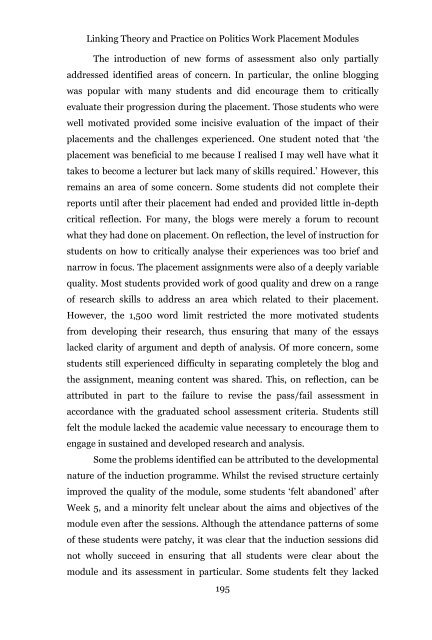The Scholarship of Engagement for Politics: - Higher Education ...
The Scholarship of Engagement for Politics: - Higher Education ...
The Scholarship of Engagement for Politics: - Higher Education ...
You also want an ePaper? Increase the reach of your titles
YUMPU automatically turns print PDFs into web optimized ePapers that Google loves.
Linking <strong>The</strong>ory and Practice on <strong>Politics</strong> Work Placement Modules<br />
<strong>The</strong> introduction <strong>of</strong> new <strong>for</strong>ms <strong>of</strong> assessment also only partially<br />
addressed identified areas <strong>of</strong> concern. In particular, the online blogging<br />
was popular with many students and did encourage them to critically<br />
evaluate their progression during the placement. Those students who were<br />
well motivated provided some incisive evaluation <strong>of</strong> the impact <strong>of</strong> their<br />
placements and the challenges experienced. One student noted that ‘the<br />
placement was beneficial to me because I realised I may well have what it<br />
takes to become a lecturer but lack many <strong>of</strong> skills required.’ However, this<br />
remains an area <strong>of</strong> some concern. Some students did not complete their<br />
reports until after their placement had ended and provided little in-depth<br />
critical reflection. For many, the blogs were merely a <strong>for</strong>um to recount<br />
what they had done on placement. On reflection, the level <strong>of</strong> instruction <strong>for</strong><br />
students on how to critically analyse their experiences was too brief and<br />
narrow in focus. <strong>The</strong> placement assignments were also <strong>of</strong> a deeply variable<br />
quality. Most students provided work <strong>of</strong> good quality and drew on a range<br />
<strong>of</strong> research skills to address an area which related to their placement.<br />
However, the 1,500 word limit restricted the more motivated students<br />
from developing their research, thus ensuring that many <strong>of</strong> the essays<br />
lacked clarity <strong>of</strong> argument and depth <strong>of</strong> analysis. Of more concern, some<br />
students still experienced difficulty in separating completely the blog and<br />
the assignment, meaning content was shared. This, on reflection, can be<br />
attributed in part to the failure to revise the pass/fail assessment in<br />
accordance with the graduated school assessment criteria. Students still<br />
felt the module lacked the academic value necessary to encourage them to<br />
engage in sustained and developed research and analysis.<br />
Some the problems identified can be attributed to the developmental<br />
nature <strong>of</strong> the induction programme. Whilst the revised structure certainly<br />
improved the quality <strong>of</strong> the module, some students ‘felt abandoned’ after<br />
Week 5, and a minority felt unclear about the aims and objectives <strong>of</strong> the<br />
module even after the sessions. Although the attendance patterns <strong>of</strong> some<br />
<strong>of</strong> these students were patchy, it was clear that the induction sessions did<br />
not wholly succeed in ensuring that all students were clear about the<br />
module and its assessment in particular. Some students felt they lacked<br />
195
















